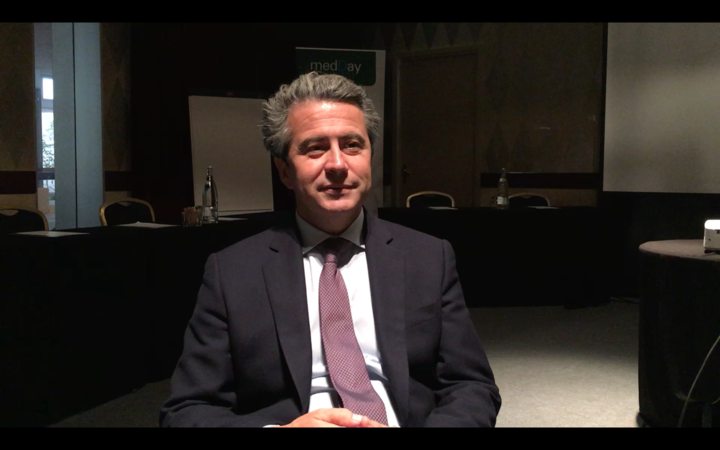#MSParis2017 – Potential Progressive MS Treatment on Move in US and Europe, MedDay CEO Says
Written by |

Frederic Sedel, CEO of MedDay
People with progressive multiple sclerosis are enrolling in a new and global Phase 3 study of MD1003, a high-dose biotin, “about as well as can be expected,” said Frédéric Sedel, co-founder and CEO of MedDay Pharmaceuticals, which is developing the high-dose biotin, a type of vitamin B.
“So far, so good,” Sedel said in an interview Thursday with Multiple Sclerosis News Today at the 7th Joint ECTRIMS-ACTRIMS Meeting in Paris, which runs through Oct. 28. “We are really on the right curve.”
That trial, called MS-SPI2 (NCT02936037), aims to enroll 600 primary or secondary progressive patients with no inflammatory activity at over 80 sites across the U.S., Canada, and Europe. It is essential to the therapy’s potential approval in the United States, Sedel said, having been specifically requested by the FDA.
But — possibly before SPI2 concludes — MD1003 might be an approved progressive MS treatment in the European Union. Sedel confirmed that MedDay has filed for regulatory approval with the European Medicines Agency (EMA) and the company is in discussions with regulatory agencies there.
He anticipates a favorable decision, noting “we strongly believe that we have enough data collected so far for EU approval.”
This data was primarily collected in a smaller-scale, but “similar,” Phase 3 trial of MD1003 (NCT02220933) in non-inflammatory progressive patients called MS-SPI. And, he said, it comes from “real-life” results collected on thousands of people in France who have been using MD1003 under an early access program.
Some 6,500 progressive patients have taken high-dose biotin — of the same quality and at the same dose given in the clinical studies — under this program, giving MedDay access to “a kind of registry … real, live data.”
Information collected largely regards safety, and results are “reassuring,” Sedel said. Simple efficacy points are also being gathered and largely support efficacy data recorded in official trials.
It is important not to overestimate this data, he added, because it’s being collected outside the rigors of a controlled study, and patients can easily come and go, leaving “gaps” in information.
“But,” Sedel said, “I think they give reassurance about the validity of the MS SPI study … [that its] results are honest.”
In the interview, Sedel also talks about the decrease in whole brain and gray matter volume seen in MD1003-treated patients after 12 months, a change he finds quite confounding.
“There is … in first 12 months a quite significant decrease in brain volume, which seems to stabilize after that, so it’s probably not brain atrophy, because brain atrophy is a more long-term process,” he said, adding that, “interestingly,” the loss is also “accompanied or associated with a higher clinical benefit.”
Sedel discusses in detail what researchers think might be its cause, and steps that will be taken in the MS-SPI2 trial to try to better understand the reason for this decrease.
An article about several MD1003 presentations at ECTRIMS can be found by clicking on this link.
The complete interview with Sedel can be seen below:


